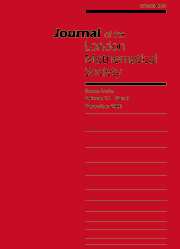INFINITELY-MANY-SPECIES LOTKA–VOLTERRA EQUATIONS ARISING FROM SYSTEMS OF COALESCING MASSES
Published online by Cambridge University Press: 01 August 1999
Abstract
The paper considers nonlinear, probability measure-valued dynamical systems that generalise those classical Lotka–Volterra equations in which, to use ecological terminology, the total size of a finite number of populations of interacting species is conserved. In this generalisation there is a ‘different species’ at each point of an arbitrary measurable space.
Such infinitely-many-species analogues of the classical Lotka–Volterra equations appear as hydrodynamic-type limits of stochastic systems of randomly coalescing masses related to those that have been used to model physical and chemical processes of agglomeration, coagulation and condensation.
One natural instance of this generalisation has closed-form solutions, including a family of solutions that exhibit soliton-like behaviour. The large time asymptotics of other classes of examples can be completely described using analogues of Lyapunov function techniques. Moreover, there are conserved quantities in the form of relative entropies that generalise those found by Volterra in the classical case. Finally, each solution has a series expansion as a time-varying, geometric mixture of a fixed sequence of probability measures. The existence of this expansion is related to the fact that the system is in martingale problem duality with a function-valued Markov process.
- Type
- Notes and Papers
- Information
- Copyright
- The London Mathematical Society 1999
Footnotes
- 1
- Cited by




